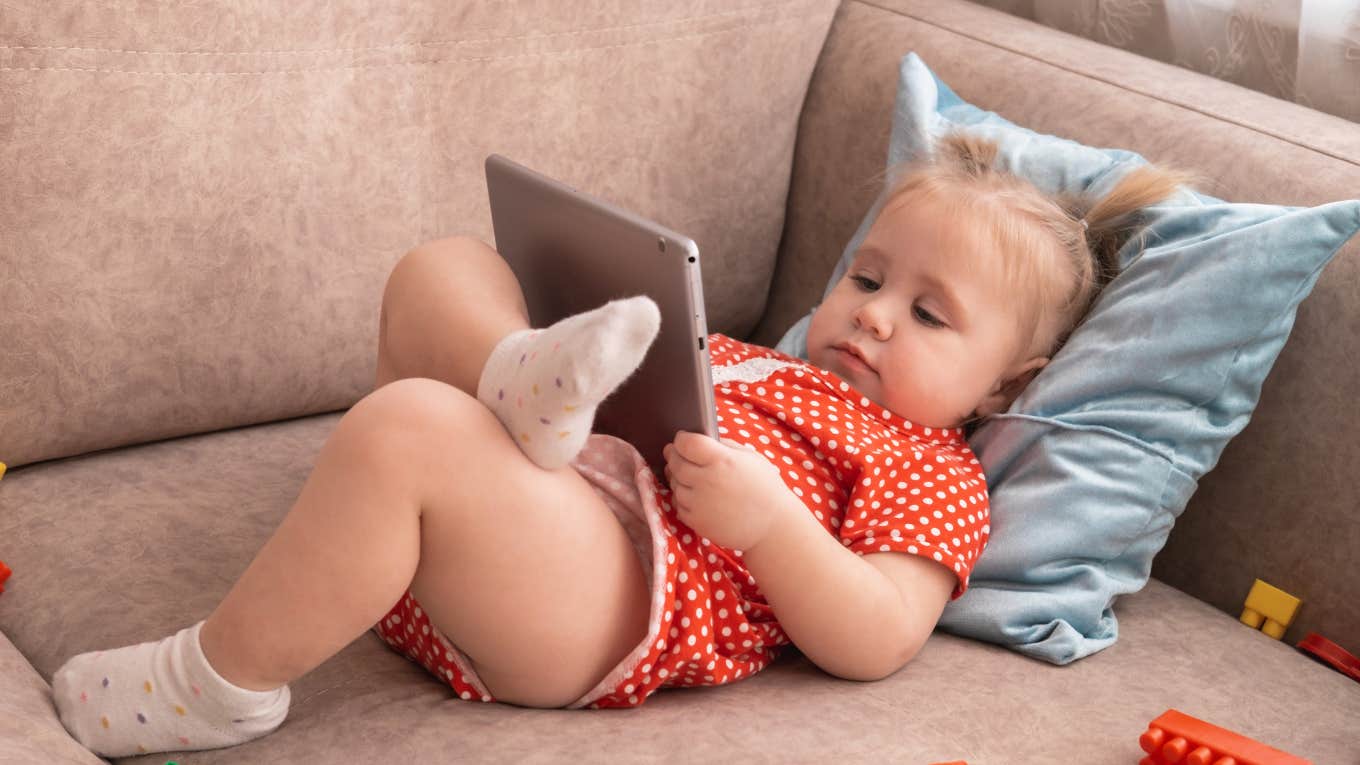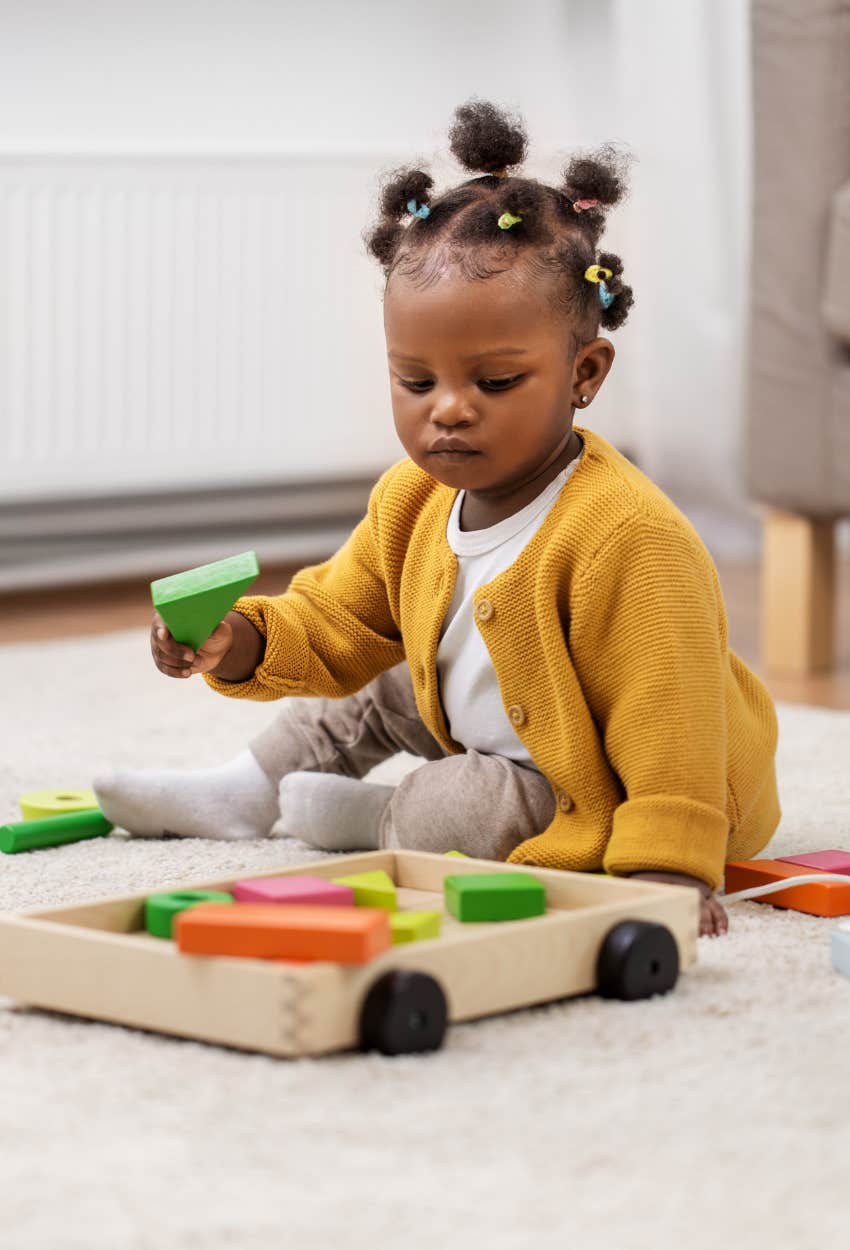Developmental Pediatrician Reveals How Much Screen Time Is Considered Safe For Children Under 2
Parents, you're not going to like the answer, but the reasoning behind it is urgent.
 Alena A | Shutterstock
Alena A | Shutterstock It's one of the most heated parenting debates: How much screen time is really too much? Screens have become so baked into our lives at this point that it seems virtually impossible to limit them for our kids, even the little ones. Nevertheless, the actual limits recommended by pediatricians are vastly tighter than most parents can even conceive, but the limits are established for vitally important reasons.
A developmental pediatrician explained why children under 2 should have zero screen time.
Yes, zero screen time. That's the bold recommendation pediatrician Dr. Joel Shulkin recently gave in a TikTok on the matter, and it was so controversial among parents he had to turn the comments off. Be that as it may, Dr. Shulkin is not alone in this particular prescription.
"I'm not pulling this out of nowhere," Dr. Shulkin said in his video. "The American Academy of Pediatrics recommends for all children under 2 no screen time, and for all children over age 2 a maximum of two hours total screen time per day. That's including TV, video games, electronics, and so on."
Now, that's not precisely true: The AAP used to recommend zero screen time for under 2s, but while the World Health Organization has stuck with that guideline, the AAP revised its recommendations in 2016. It now says that screen time for children under 2 should be as minimal as possible, center on educational content only, and — here's the kicker — only "IF their parents play or view with them and reteach the lessons."
Many parents scoff at these suggestions, but Dr. Shulkin explained the very valid reasons why they have been made. In short, screen time use in kids across the board has been extensively shown to result in developmental delays of all kinds for kids of all ages.
Studies have shown that kids don't actually learn much from screens besides repetition.
In his video, Dr. Shulkin referenced a thing he commonly hears from parents: They notice how adept their babies and toddlers are at navigating electronic devices and assume this means their kids are advanced and learning by leaps and bounds.
But is this true? "Unfortunately, no," Dr. Shulkin bluntly said, citing studies that have shown that infants as young as 6 months can navigate a touchscreen very easily because the gestures required to do so are now so basic.
More to the point, he explained that multiple studies have shown that children don't really learn much of anything from screens besides repetition. That is, they may be able to say their numbers and letters from watching a show on a screen, but all they've actually learned is to replicate the sounds they've heard on the show.
It's like when we, as adults, meet a person who speaks a foreign language and ask them to teach us a phrase. Sure, we can make the sounds, but we don't have any idea what we're actually saying. For kids, this is even more true because of the way their brains actually learn. Screens really are no substitute for real-time, in-person communication.
Studies have also shown that kids need in-person interaction to actually learn concepts.
It's not exactly surprising that there are so many studies showing incredibly strong correlations between early screen time and substantial speech and learning delays. As Dr. Shulkin put it, "Repetition is not the same as learning."
To illustrate this, he cited a 2003 University of Washington study that found that after less than five hours of in-person instruction from a native Mandarin speaker, 9-month-old American infants could actually understand and respond to Mandarin, just like they could to English.
But when given the exact same lesson from the exact same Mandarin speaker on a DVD — the "screen time" of that era — they basically learned nothing. "There is something innately different between learning from a person and learning from a screen," Dr. Shulkin explained, "and a lot that has to do with the non-verbal cues" and other responsive "nuances" that come with in-person interaction.
Miss Rachel, for all her brilliance, cannot replicate that, and this is likely why the AAP is so emphatic that under-2s' screen time be done with parent involvement only. It's so that parents can provide those missing elements, nuances, and variety that fMRI brain studies have shown kids need to actually learn a concept. Dr. Shulkin pointed out that this is even more important for kids with autism, who already struggle with nonverbal cues in the first place.
Dr. Shulkin also recommended that parents stop using screens for moments when they need to keep kids occupied.
Whether we like it or not, we live in a digital world, not an analog one, and kids need to know how to use tech to get by, right? What about their careers down the road? What if their life's work will be entirely screen-based? These are valid questions, but Dr. Shulkin said worrying about this with kids this young is putting carts before horses.
Parents should "focus more on functional communication using gestures, learning what words mean, associating the sounds with the objects that they're seeing and the actions that they're seeing." Again, they need real-life interaction to do that, and this includes moments when parents need something to occupy their child.
 Syda Productions | Canva Pro
Syda Productions | Canva Pro
As a parent himself, Dr. Shulkin said he understands that sometimes you have to plunk a kid in front of a screen in order to get something done or get through a meal. Those moments are just part of the deal. But when possible, he urged parents to choose non-screen activities instead.
Sensory, tactile toys or things like Play-Doh and kinetic sand, depending on what's age appropriate, actually help kids learn. They also present an important opportunity, Dr. Shulkin added, for parents to then join their kids in these activities once the task they need to tend to is complete, and give them more of that in-person interaction they need in order to learn and develop, and which screens simply cannot provide.
John Sundholm is a writer, editor, and video personality with 20 years of experience in media and entertainment. He covers culture, mental health, and human interest topics.

